|
|
|
Sort Order |
|
|
|
Items / Page
|
|
|
|
|
|
|
| Srl | Item |
| 1 |
ID:
126641
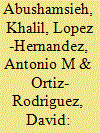

|
|
|
|
|
| Publication |
2013.
|
| Summary/Abstract |
Gulf Cooperation Council countries are seeking to develop their governmental financial information systems to make them more informative and transparent. The aim of this article is to determine the extent to which Qatar has developed its governmental financial information systems in response to the enormous degree of economic and administrative development in recent decades, and to identify the most important factors that have influenced the reforms made in this area. For this purpose, Lüder's Financial Management Reform Process Model (2001) was referred to and semi-structured interviews were carried out with governmental accounting officials in Qatar in June 2011.
|
|
|
|
|
|
|
|
|
|
|
|
|
|
|
|
| 2 |
ID:
064596
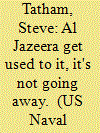

|
|
|
| 3 |
ID:
187261
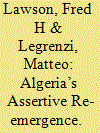

|
|
|
|
|
| Summary/Abstract |
Algeria is re-emerging as an active player in international politics following the Arab Spring uprisings that swept across the Middle East and North Africa beginning in 2010–11. But it has adopted a much different posture from the one it maintained during the 1960s and 1970s. The broadly accommodative attitude that Algiers previously exhibited towards the outside world has been replaced by a more combative stance. Military power has become its primary tool for managing inter-state disputes, and Algeria has stepped up its involvement in the domestic affairs of nearby states. These changes have contributed to the resurgence of conflict in North Africa at a moment when the regional order might well have moved in a more peaceful direction.
|
|
|
|
|
|
|
|
|
|
|
|
|
|
|
|
| 4 |
ID:
111228
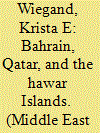

|
|
|
|
|
| Publication |
2012.
|
| Summary/Abstract |
The Hawar Islands dispute, resolved in 2001, is the only territorial dispute between two Arab states that has been resolved by the International Court of Justice (ICJ). Several factors played a role in influencing Qatar and Bahrain to resolve their dispute at the ICJ: 1) the inability of Arab states and the Gulf Cooperation Council (GCC) to mediate the dispute, 2) incentives for significant oil and natural gas reserves, and 3) incentives for bilateral and regional cooperation on salient issues between the two states. Both states have benefited significantly since the resolution of the dispute.
|
|
|
|
|
|
|
|
|
|
|
|
|
|
|
|
| 5 |
ID:
008685
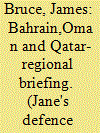

|
|
|
|
|
| Publication |
Sept 30,1995.
|
| Description |
25-35
|
|
|
|
|
|
|
|
|
|
|
|
|
|
|
|
| 6 |
ID:
180358
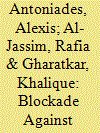

|
|
|
|
|
| Summary/Abstract |
On 5 June 2017, the United Arab Emirates, Bahrain, Saudi Arabia, and Egypt cut diplomatic ties with the State of Qatar and initiated a blockade against the country. In this study, we provide the first in-depth examination of the impact the blockade had on Qatar’s economy and review the policy responses that followed. In particular, we consider how the policies that have since emerged either complemented or deviated from past policies and practices and evaluate whether they have in fact brought long-term benefits to the country –– benefits that may have not been realized had the blockade not taken place. Our review finds that the blockade did not cause a shift in policy direction, but it did change the urgency and process by which policies were put together and pushed forward, as well as their effectiveness. Furthermore, we find that the timing of the blockade worked in Qatar’s favor in surprising ways. To the best of our knowledge, this is the first study to provide both a meticulous documentation of the policy responses that followed the blockade and an in-depth analysis of its impact.
|
|
|
|
|
|
|
|
|
|
|
|
|
|
|
|
| 7 |
ID:
176538
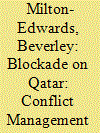

|
|
|
|
|
| Summary/Abstract |
Current tensions in the Gulf region highlight the persistence of crises and conflict. A number of states within the area now regularly engage in interventionist actions that challenge previously held norms of sovereignty and non-intervention. Fragmentation characterises what were once considered fairly robust structures of unity and enduring regional organisation. Theoretical norms that presuppose non-intervention are tested by new forms of coercion and interventionism among Gulf actors that exacerbate rather than resolve security dilemmas. In turn, this highlights the inadequacies of normative models of conflict management and resolution, and in particular mediation. These developments are examined in the case of the blockade against Qatar instituted by Bahrain, Egypt, Saudi Arabia and the United Arab Emirates in June 2017.
|
|
|
|
|
|
|
|
|
|
|
|
|
|
|
|
| 8 |
ID:
170659


|
|
|
|
|
| Summary/Abstract |
China–Qatar ties have strengthened considerably in recent years. The relationship between the two countries has seen steady and smooth bilateral development in the political, economic and cultural fields; in trade, energy and other areas and has given active play to the complementarities between the two economies. This study wants to examine the motivation behind Beijing’s measures to formalise a strategic partnership with Qatar to understand the impact and the extent of the Qatar-Gulf crisis on Doha engagement and integration within the Belt and Road Initiative. China’s measures to formalise strategic partnerships with Qatar includes seven major areas for cooperation: policy coordination, connectivity, trade and investments, energy cooperation, financial cooperation, military ties, tourism and cultural ties.
|
|
|
|
|
|
|
|
|
|
|
|
|
|
|
|
| 9 |
ID:
179794
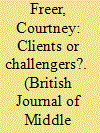

|
|
|
|
|
| Summary/Abstract |
Traditional understandings of Middle Eastern politics place tribes as critical supporters of ruling families; this dynamic is considered particularly strong within the smaller Gulf states, which are oftentimes even referred to as ‘bedouinocracies’. While tribes undoubtedly hold political capital throughout the Middle East, it is uncertain to what extent they remain clients of Gulf regimes or are in fact independent, and potentially oppositional, actors. This paper examines electoral outcomes for the Kuwaiti legislature, Qatari municipal council, and Emirati consultative council to understand the extent to which major tribal groups take collective action through electoral campaigns.
|
|
|
|
|
|
|
|
|
|
|
|
|
|
|
|
| 10 |
ID:
170047
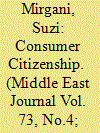

|
|
|
|
|
| Summary/Abstract |
While Qatari museums strive to provide a platform for the nation's "voice," this article argues that museum merchandise occupies a new, elevated role in Qatar's contemporary neoliberal environment — as an extension of the country's global outreach and nation-branding. Since state-sanctioned museum merchandise is necessarily expressive of state policies, this article contends that Qatar's museum gift shops are reformulating the signifiers of Qatari national identity through contemporary commodities and redrawing the parameters of national belonging.
|
|
|
|
|
|
|
|
|
|
|
|
|
|
|
|
| 11 |
ID:
190344
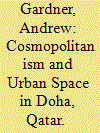

|
|
|
|
|
| Summary/Abstract |
This essay commences with an ethnographic sojourn through the Industrial Area, a peripheral zone of the urban landscape in Doha, Qatar that is densely inhabited by low wage migrant laborers. In this segregated urban enclave, I ascertain the openness to alterity and the interactions with difference that connect their experiences to the conceptual legacy of cosmopolitanism. Via a discussion of the segregated experiences of transnational migrants in Doha’s urban landscape, I then stake out a speculative argument for the connection between that segregation and the resulting cosmopolitan conditions. Together, these two assertions explore manifestations of cosmopolitan urbanism in non-Western and non-democratic cities. In the conclusion to this essay, I suggest that we might usefully disentangle our assessment of these cosmopolitan conditions from our sustained critiques of the global landscape of inequality, and turn my attention briefly to the western ethnocentricities that suffuse the analytic lens by which we gauge cosmopolitanism and the city.
|
|
|
|
|
|
|
|
|
|
|
|
|
|
|
|
| 12 |
ID:
132936
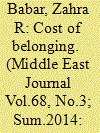

|
|
|
|
|
| Publication |
2014.
|
| Summary/Abstract |
In Qatar, processes of constructing citizenship have been strongly state-driven over the past four decades. This article reviews the primary in?uences on Qatari citizenship laws, including historical and contemporary social contexts that have impacted the development of relevant legislation. The article argues that the existing ?nancial privileges of Qatari citizenship as well as the presence of a dominant nonnational population have led to an ever more restrictive legal environment around access to citizenship.
|
|
|
|
|
|
|
|
|
|
|
|
|
|
|
|
| 13 |
ID:
190351
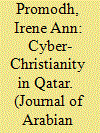

|
|
|
|
|
| Summary/Abstract |
In the year 2020, COVID-19 wreaked havoc on everyday life in the Persian Gulf. Yet little is known about how non-citizens responded to a virus that inexorably exposed their transience and precarity. This article addresses a much-neglected aspect of local responses to COVID-19, namely, how non-citizens made sense of the virus theologically. Drawing on existing scholarship on cyber religion and migrant religiosity in the Gulf, I examine the theological responses of a distinctive subset of non-citizens –– Pentecostal-Charismatic Christians in Qatar. My approach, rooted in digital ethnographic methods, led me to uncover divergent theological responses to COVID-19 among lower-income “migrants” and higher-income “expats”. Lower-income “migrants” sought spiritual remedies to counter what they deemed to be a man-made virus, whereas higher-income “expats” strove for spiritual perfection during what they believed was a divine trial. Working through these divergent theological responses, I argue that both “migrants” and “expats” built stronger affinities to their host state during the pandemic as they developed new forms of spiritual communitas online.
|
|
|
|
|
|
|
|
|
|
|
|
|
|
|
|
| 14 |
ID:
111998
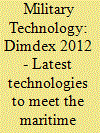

|
|
|
| 15 |
ID:
132058
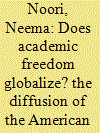

|
|
|
| 16 |
ID:
122811
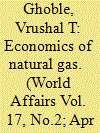

|
|
|
| 17 |
ID:
098962
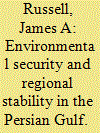

|
|
|
| 18 |
ID:
163852
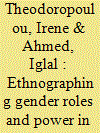

|
|
|
|
|
| Summary/Abstract |
This ethnographic study examines how gender roles associated with male and female Qatari students in intercultural communication courses in a university in Qatar are negotiated between them and their two female instructors from the US and Greece. Our aim is to contribute towards the development of good practice related to the teaching of information exchange among group members who are not culturally alike,1 by arguing that an efficient way of overcoming misunderstandings between instructors and students is to engage in a pedagogical approach, which we call “dialogical infotainment”. This serves the ultimate goal of sharing various types of power in order to sharpen our cultural sensitivity and subsequent tolerance and respect for each other’s gender role-related peculiarities.
|
|
|
|
|
|
|
|
|
|
|
|
|
|
|
|
| 19 |
ID:
178585
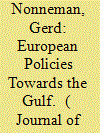

|
|
|
|
|
| Summary/Abstract |
This paper discusses European policies towards the Qatar crisis in the context of the evolution of broader past and present European policies towards the Gulf. It starts with a summary discussion of historical patterns of relations between Europe and the Gulf, before briefly sketching the major changes in the regional environment after the Second World War, beginning with the US supplanting the UK as the dominant hegemon, through to the changes wrought by Trump’s elevation to the US presidency. It then turns to a discussion of the effects of these changes for the Gulf and other regional states and their policy postures, before going on to examine the ways in which European states and the EU have interpreted and reacted to this changing environment. These reactions are often at one and the same time a reaction to the changes and uncertainties in US policy under Trump, since this changing US role is also a crucial ingredient both in the region and for Europe’s room for manoeuvre. Against this background, the paper will outline European policies towards the Gulf theater in particular, focusing on Iran and the JCPOA nuclear deal, and the GCC (or Qatar) crisis –– while also briefly considering the Yemen crisis and the impact of Gulf competition on and in the Libyan theater. From October 2018, the Khashoggi affair added an additional dimension to the crisis, as did the renewed oil price crash amidst the global COVID-19 pandemic beginning in 2020.
|
|
|
|
|
|
|
|
|
|
|
|
|
|
|
|
| 20 |
ID:
109771
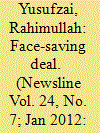

|
|
|
|
|
| Publication |
2012.
|
| Summary/Abstract |
Does Pakistan figure in the face-saving deal that the US is trying to thrash out with the Taliban in Doha?
|
|
|
|
|
|
|
|
|
|
|
|
|
|
|
|
|
|
|
|
|